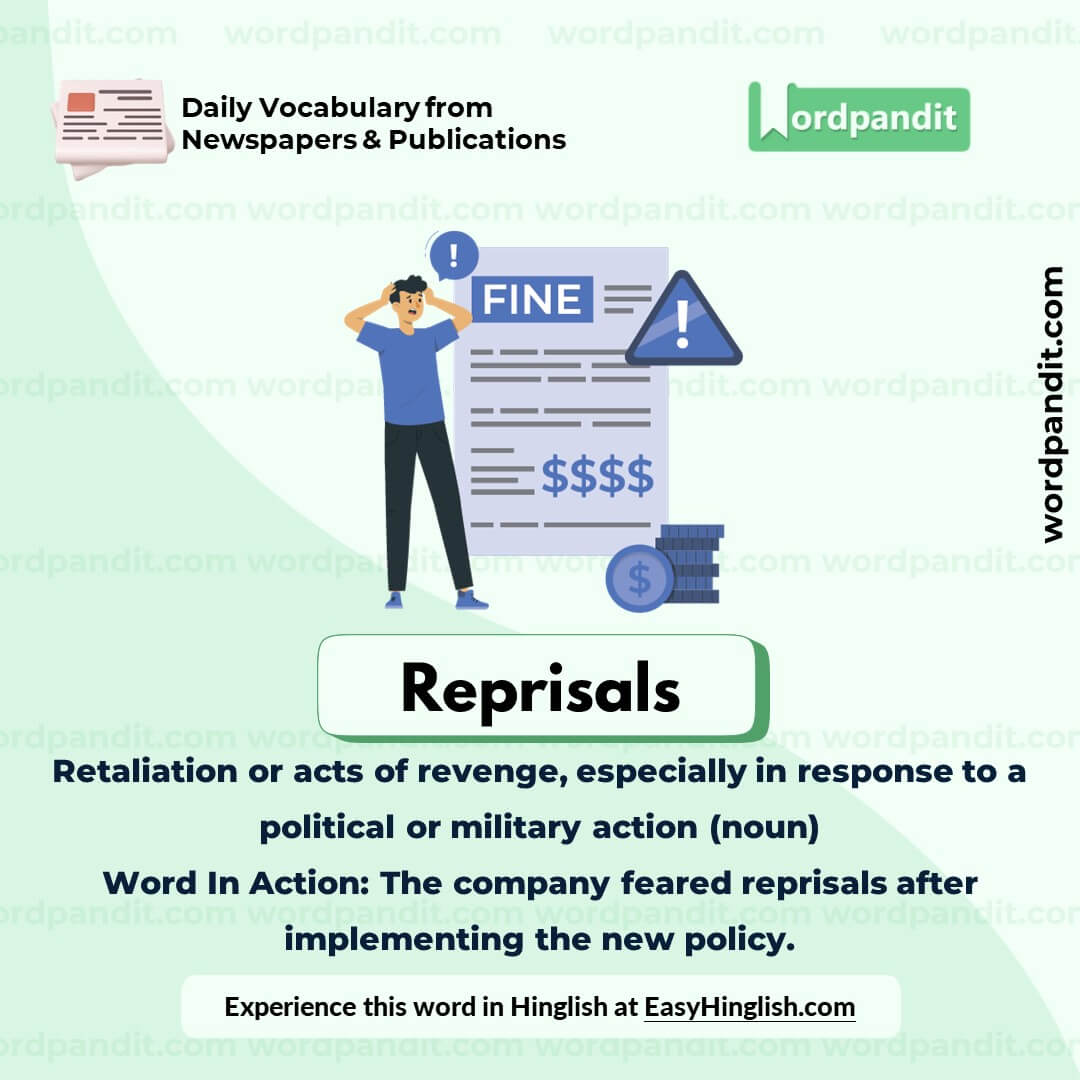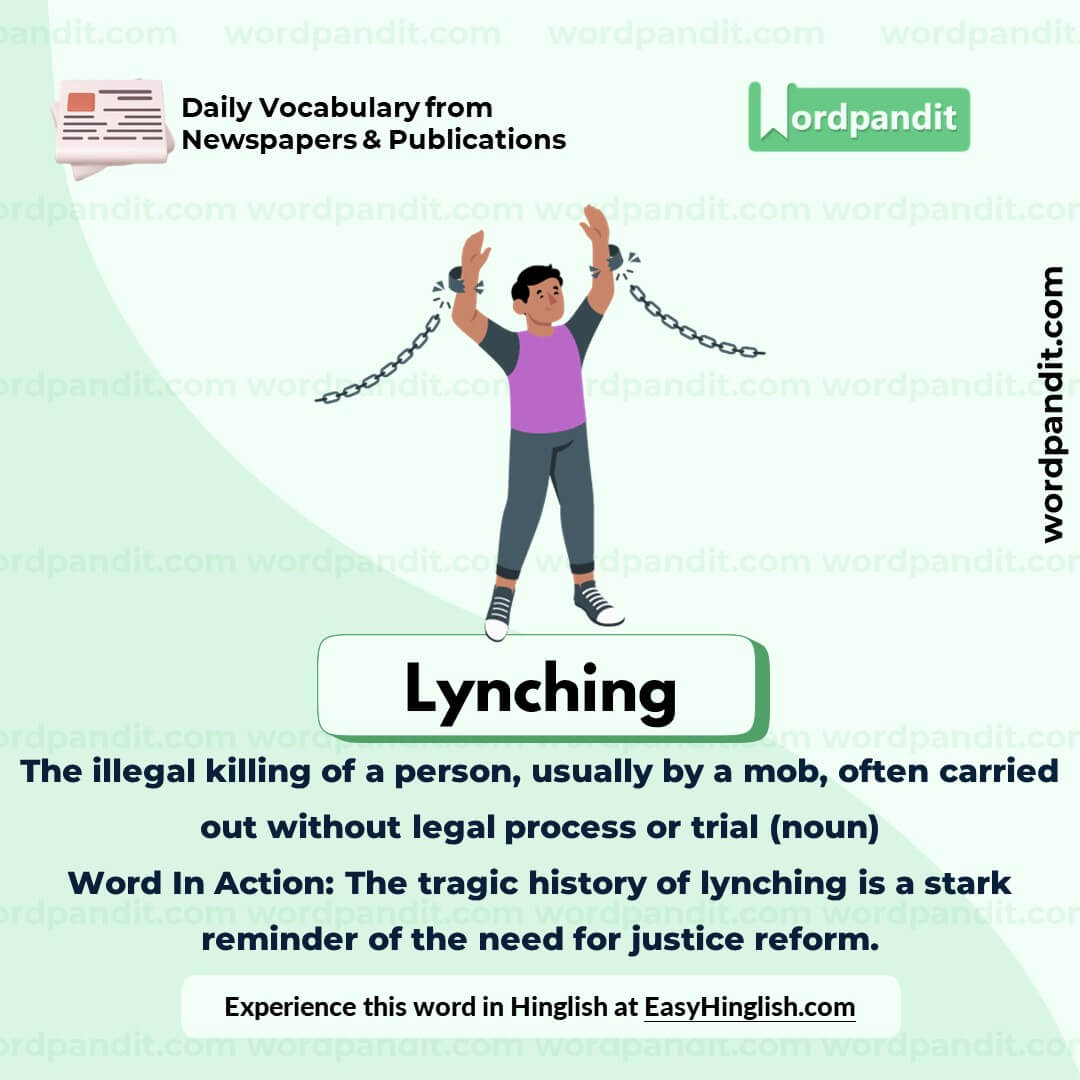Daily Vocabulary from Indian Newspapers and Publications
Welcome to Wordpandit’s Indian Vocabulary Hub
At Wordpandit, we understand the importance of staying rooted in the local context while expanding your language skills. This section focuses on enriching your vocabulary with words and phrases drawn from India’s leading newspapers and publications, ensuring you're learning vocabulary that is practical, relevant, and uniquely Indian.
Why Indian Sources Matter
We believe that the best way to master any language is by immersing yourself in local content. That’s why we carefully curate vocabulary from top Indian publications, including:
- The Hindu
- The Times of India
- The Economic Times
- Hindustan Times
- Live Mint
- The Indian Express
- And many others...
Stay Updated, Stay Relevant
With daily updates from Indian news sources, you’ll be consistently learning words that reflect the trends and shifts in Indian society and culture. Our focus is to provide vocabulary that enhances your understanding of the language in an Indian context.
How Wordpandit Supports Your Goals
Whether you’re preparing for exams, aiming to improve your professional communication, or simply want to stay connected with the latest Indian vocabulary, Wordpandit is here to guide you every step of the way.
Learn with a Practical Approach
Our interactive learning methodology includes real-world examples, engaging activities, and context-specific usage to ensure that every word becomes part of your active vocabulary.
Dive into Indian Vocabulary Today!
Why Choose Wordpandit?
Practical Learning: Focus on words you'll actually encounter in real-world reading, enhancing your comprehension and communication skills.
Diverse Content: From current affairs to scientific breakthroughs, our varied sources expose you to vocabulary across multiple domains.
Effortless Integration: Make Wordpandit a part of your daily routine. Just a few minutes each day can significantly boost your lexicon over time.
Your Path to Vocabulary Mastery
- Visit our Daily Vocabulary section regularly
- Explore new words and their usage in context
- Practice incorporating these words into your own writing and speech
- Track your progress as your vocabulary expands
Start Your Journey Today
Embark on your vocabulary enhancement journey with Wordpandit. By consistently engaging with our daily posts, you'll build a robust vocabulary that serves you well in academic, professional, and personal contexts.
Remember, a word a day keeps linguistic limitations at bay. Make Wordpandit your daily companion in the quest for vocabulary excellence!
WORD-1: Siphoned
Context:
"Karnataka’s tax contributions are being siphoned off to states that have failed to manage their resources, leaving Karnataka struggling during crises like floods and droughts without adequate support from the Centre." - New Indian Express
Explanatory Paragraph:
The word siphoned is used when something, often funds or resources, is taken away from its intended destination and redirected elsewhere, typically in a way that seems unfair or unauthorized. In this context, Karnataka's contributions are being diverted to other states, reducing the resources available to it during emergencies.
Meaning: To draw off or transfer (resources or funds) from one place to another, often in a surreptitious or improper way (verb)
Pronunciation: SAI-fuhnd
Difficulty Level: ⭐⭐⭐ (Intermediate)
Etymology: Derived from the Middle English "siphone," from Latin siphon meaning "tube" or "pipe," which was used to transport liquids.
Synonyms & Antonyms:
Synonyms: divert, drain, channel, extract, funnel
Antonyms: supply, give, return, replenish, restore
Usage Examples:
- The company discovered that funds were being siphoned from its accounts over several months.
- Resources meant for local schools were siphoned off by corrupt officials.
- Their energy was being siphoned into endless tasks, leaving little time for creativity.
- He was accused of siphoning donations intended for charity to his personal accounts.
Cultural Reference:
In environmental conservation discussions, the term "siphoned" is often used to describe how natural resources, such as water or minerals, are exploited or drained from one region to benefit another, often leading to ecological and economic imbalance.
Think About It:
What could be the impact on communities when resources are siphoned away? How might this affect public trust?
Quick Activity:
Think of a situation in which you felt your energy or time was being "siphoned." Describe it in a few sentences and how it made you feel.
Memory Tip:
Picture a siphon tube draining a liquid from one container to another, much like funds or resources being taken from one area to another, to remember "siphoned."
Real-World Application:
The concept of "siphoning" is often used in financial, political, and social discussions to highlight situations where resources are redirected in unintended ways, impacting those who are deprived of them.
WORD-2: Prudential
Context:
"I believe that power demand has to go up. This sector is trading very cheap right now. It has good scope to go on, because it is a sector without which we cannot live – just like telecom and pharma,” he said at the launch of ICICI Prudential AMC’s Business Cycle Fund." - Economic Times
Explanatory Paragraph:
The term prudential generally refers to actions, decisions, or policies that are wise, cautious, and guided by good judgment, especially in financial or regulatory contexts. In this case, the name "ICICI Prudential" suggests a focus on careful and responsible financial management, aiming to create balanced and thoughtful investment opportunities.
Meaning: Involving or showing care and foresight, especially in business or financial matters (adjective)
Pronunciation: proo-DEN-shuhl
Difficulty Level: ⭐⭐⭐ (Intermediate)
Etymology: From the Latin word prudentia, meaning "foresight" or "wisdom"
Synonyms & Antonyms:
Synonyms: cautious, judicious, wise, careful, circumspect
Antonyms: reckless, imprudent, careless, thoughtless, unwise
Usage Examples:
- The bank follows prudential regulations to ensure financial stability.
- Prudential decisions in investment often lead to steady, long-term growth.
- Her prudential approach to budgeting helped her avoid debt.
- Many institutions set up prudential guidelines to protect investors.
Cultural Reference:
The concept of "prudence" is often highlighted in classic works like Aristotle’s "Nicomachean Ethics," where prudence is considered one of the central virtues for making good choices and living a balanced life.
Think About It:
Why do you think prudence is valued so highly in financial and business sectors? How does it influence decisions?
Quick Activity:
List two decisions you've made recently that you would consider "prudential" and explain why they required careful judgment.
Memory Tip:
Remember "prudential" by thinking of "prudent," which means wise and cautious, a key quality in finance and business.
Real-World Application:
The term "prudential" is used in finance to indicate responsible, risk-managed strategies, often seen in regulatory frameworks and guidelines set by financial institutions to protect clients and ensure stability.
WORD-3: Replenish
Context:
"What this has meant for motorists is that they have to spend precious fuel looking around for outlets to replenish their tanks." - The Hindu
Explanatory Paragraph:
The word replenish means to refill or restore something to its previous level. In the example, it refers to motorists needing to find gas stations to refill or “replenish” their fuel tanks. It can be used in various contexts, like replenishing food supplies, energy, or other resources.
Meaning: To fill up again; to restore to the former level (verb)
Pronunciation: ri-PLEN-ish
Difficulty Level: ⭐⭐ (Easy)
Etymology: From the Old French repleniss-, meaning "to fill up," and from Latin plenus meaning "full"
Synonyms & Antonyms:
Synonyms: refill, restock, recharge, restore, renew
Antonyms: deplete, drain, empty, exhaust, diminish
Usage Examples:
- After a long hike, he stopped by a stream to replenish his water bottle.
- The company had to replenish its stock due to high demand.
- It's important to replenish your energy by getting enough rest.
- The farmer worked to replenish the nutrients in the soil for next season’s crops.
Cultural Reference:
The concept of "replenishment" is essential in environmental conservation, where efforts focus on replenishing natural resources, like forests and water reserves, to maintain ecological balance.
Think About It:
What are some resources in your daily life that you often need to replenish? Why is it important to keep them well-stocked?
Quick Activity:
List three items in your home that you regularly replenish. Consider why these items are essential to keep available.
Memory Tip:
Think of “replenish” as "re-fill" or "re-stock" to help remember that it means to fill up again.
Real-World Application:
The word "replenish" is widely used in supply chain management, where businesses regularly replenish inventories to meet customer demand and avoid stockouts.
WORD-4: Reprisals
Context:
"Journalists became the 'enemy of the people' -- a phrase he would later tweak to the 'enemy from within' as he called for reprisals against all political opponents." - Economic Times
Explanatory Paragraph:
Reprisals refer to retaliatory actions or measures taken as punishment or in response to an offense. Often used in political or military contexts, reprisals indicate a reaction meant to repay or punish an action perceived as harmful or unjust. Here, it implies a call for retribution against political rivals.
Meaning: Retaliation or acts of revenge, especially in response to a political or military action (noun)
Pronunciation: ri-PRAHY-zuhlz
Difficulty Level: ⭐⭐⭐⭐ (Advanced)
Etymology: From the Old French reprisaille, which means "retaliation" or "taking back," based on the Latin prehendere meaning "to seize."
Synonyms & Antonyms:
Synonyms: retaliation, revenge, retribution, vengeance, counterattack
Antonyms: forgiveness, pardon, leniency, mercy, tolerance
Usage Examples:
- The government warned that any attack on its forces would be met with swift reprisals.
- Fearing reprisals, the whistleblower chose to remain anonymous.
- Historical reprisals often sparked cycles of conflict between rival groups.
- They faced reprisals from management after protesting working conditions.
Cultural Reference:
The idea of reprisal is central to Shakespeare's tragedy Hamlet, where cycles of revenge lead to conflict and tragedy, illustrating the destructive nature of retaliation.
Think About It:
How might acts of reprisal impact relationships or conflicts over the long term? Are there alternatives to retaliation?
Quick Activity:
Consider a situation where you felt wronged. Write about how a reprisal might have affected the situation positively or negatively.
Memory Tip:
Think of "reprisals" as "re-payments" or "re-venge," as both refer to actions taken in response to an offense.
Real-World Application:
The concept of reprisals is often discussed in international law, where reprisals are carefully regulated to avoid escalating conflicts and to protect civilians.
WORD-5: Lynching
Context:
"Law and order was never in a crazy situation as it is today; mob lynching was never the case here, people never fought over religion and caste." - The Hindu
Explanatory Paragraph:
The term lynching refers to an unlawful act where a mob takes justice into its own hands by attacking or killing someone, often without a fair trial. Historically, lynching has been used as a violent form of vigilante "justice," frequently targeting minority or marginalized groups and reflecting deep social divisions.
Meaning: The illegal killing of a person, usually by a mob, often carried out without legal process or trial (noun)
Pronunciation: LINCH-ing
Difficulty Level: ⭐⭐⭐⭐ (Advanced)
Etymology: Originated from American English in the late 18th century, associated with Charles Lynch, a Virginia justice of the peace who conducted extrajudicial punishments during the American Revolution.
Synonyms & Antonyms:
Synonyms: execution, vigilante justice, mob justice, assassination
Antonyms: trial, due process, legal justice, acquittal
Usage Examples:
- The rise in lynching incidents raised concerns about the breakdown of law and order.
- History books document lynching as a dark chapter in civil rights struggles.
- The court emphasized that lynching undermines justice and rule of law.
- Activists protested against mob lynching, calling for stricter anti-lynching laws.
Cultural Reference:
In American history, lynching became a symbol of racial violence, particularly during the 19th and early 20th centuries, targeting African Americans in the Southern United States. This period is a focus of civil rights movements seeking justice and remembrance for victims.
Think About It:
How do you think communities can address and prevent the social tensions that often lead to incidents of mob violence or lynching?
Quick Activity:
Research a historical case of lynching and write a brief reflection on the social impact it had at the time and any legal changes that followed.
Memory Tip:
Remember "lynching" as a harsh, lawless act that often involves a "mob launching" an attack on someone without a trial.
Real-World Application:
The term "lynching" is still relevant today, with anti-lynching laws and social justice movements continuing to advocate for legal and protective measures against mob violence.
















